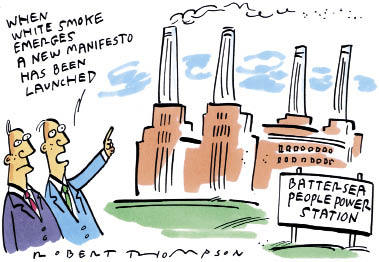
Mr Gordon Brown, the Prime Minister, sent the Foreign Secretary to a nuclear security summit in Washington, so that he could launch the Labour party manifesto in an empty hospital in Birmingham. It promised to halve the annual deficit by 2014, through growth, taxes and cuts, but not to raise rates of income tax and not to extend VAT to food, children’s clothes, books, newspapers and public transport fares. Underperforming schools might be taken over by more successful ones; failing police forces might be taken over by more successful ones. There would be a referendum before 2011 on the alternative vote method of electing MPs. Mr David Cameron launched the Conservative manifesto at Battersea power station, promising: ‘People power, not state power.’ It proposed a right to veto council tax rises through local referendums, and for communities to buy their local pub or post office and to run schools. The number of MPs would be cut by a tenth. An emergency budget would be held within 50 days, to eliminate the bulk of the deficit over five years. Public-sector pay would be frozen for 2011. Those on Incapacity Benefit will be reassessed. There would be an annual limit on the number of non-EU economic migrants. The Liberal Democrats proposed raising the income tax threshold to £10,000. They also put up posters with the invented claim: ‘You’d pay £389 more in VAT a year under the Conservatives.’ Mr Brown, asked in a television interview what his biggest mistake had been, said: ‘In the 1990s, the banks… We should have been regulating them more.’ The leaders of the three main parties then limbered up for this week’s television debate, the first of three planned. The Royal Mail suspended deliveries to a house in Leeds after postmen were chased by a 19-year-old cat called Tiger.
The Real IRA said that it had set off a bomb that exploded in the middle of the night at a barracks between Belfast and Holywood where MI5 has its Northern Ireland headquarters. Malcolm McLaren, the manager of the Sex Pistols, died, aged 64. Kenneth McKellar, the singer, died, aged 82. Mark Damazer, the controller of BBC Radio 4 is leaving to become the Master of St Peter’s College, Oxford. Transport for London bought the rights to the Oyster card brand for £1 million from the TranSys consortium. The National Health Service corrected 400,000 records giving the wrong organ as the one for which donors had given permission for removal after death; 20 cases of mistaken removal have so far come to light. The M4 in Wiltshire was closed when a lorry overturned killing 13 pigs and letting dozens escape. The Grand National was won by Don’t Push It, ridden by Tony McCoy at his 15th attempt.
President Lech Kaczynski and many prominent figures in Polish public life died among all 96 on an aeroplane that crashed trying to land at Smolensk in Russia. They had been travelling to a ceremony to mark the 70th anniversary of the massacre by Soviet secret police of thousands of Polish officers at Katyn. Among those who died in the crash were Ryszard Kaczorowski, the last Polish President in Exile in London, aged 90; Anna Walentynowicz, the crane driver whose sacking sparked off the Solidarity movement, aged 80; the chief of the defence staff, the commanders of the army, navy and air force, the head of the security service, the governor of the national bank; 15 MPs and three senators. Eduard Chuvashov, a Russian federal judge, was shot dead outside his flat in Moscow. Ukraine agreed to eliminate its entire stockpile of weapons-grade nuclear material. Cuba privatised barbers with three seats or fewer.
Eurozone countries agreed to provide up to E30 billion in the coming year to guarantee loans to Greece, if it needs them, at 5 per cent. A Greek man sued a Swedish dairy company for using his photograph on pots of Turkish-style yoghurt. In Bangkok, 21 died when soldiers tried to dislodge red-shirted anti-government protesters from a site in the city centre. Roza Otunbayeva, an ex-foreign minister who took control of Kyrgyzstan after a revolt that overthrew President Kurmanbek Bakiyev, told the United States that she would honour its use of a military base from which it supplies forces in Afghanistan. President Dmitry Medvedev of Russia said he thought Kyrgyzstan was on the brink of civil war. Hundreds died in an earthquake in the western Chinese province of Qinghai. Bishop Abel Muzorewa, the first black Prime Minister of Zimbabwe-Rhodesia, died, aged 84. Sherpas cancelled plans to scatter some of the ashes of Sir Edmund Hillary at the summit of Everest after lamas warned that the act would be inauspicious. CSH
Micheal Heath returns next week.






Comments